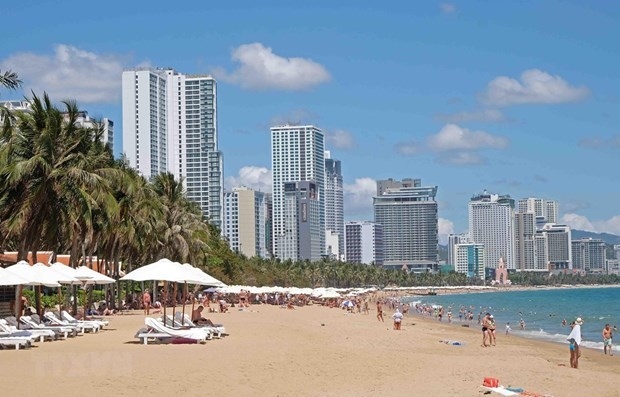Status of real estate up in air as globe strives for recovery
 |
| Illustration photo. Photo: VNA |
Experts noted that while the first quarter of 2021 recorded some positive signals for real estate recovery, May and June’s increase in coronavirus cases has put a dampener on the national economy and the real estate market in particular.
Nevertheless, the latest outbreaks may still create an opportunity for real estate developers who have proved their value and strength in quality products.
With social distancing and different measures being utilised to combat the pandemic, investors are being prevented from entering or leaving the country. As a result, investors, developers, and buyers are remaining cautious when making any decisions.
The limited income source of the majority of people at this time has lowered purchase power. Most transactions currently are mainly long-term investors, while short-term speculators have temporarily disappeared from the market to wait for incoming opportunities.
When the market recovers, mid and lower-end residential is forecast to be the most active segment because actual demand for housing is still an urgent need. However, the market’s absorption rate will not be as high as in previous years because people have fewer finances due to the impact of COVID-19.
Tourism and hospitality, in the last six months of the year, is set to remain heavily affected even if the pandemic is effectively controlled, and it will take a long time to get anywhere near 2019 levels..
The retail market, trade centres, and traditional supermarkets will also face significant difficulties when competing with online sales methods and advanced technology platforms.
Office supply has received the most interest from domestic and foreign investors in previous years. When the market recovers, with a limited supply of Grade A and B segments in locations such as Ho Chi Minh City and Hanoi, the market may not have many buildings ready for sale to both domestic and overseas investors.
As for industrial real estate, the interest from financiers has still increased. However, the market still faces restrictions due to current travel issues.
| Lim Hua Tiong - CEO, Frasers Property Vietnam
Vietnam’s economy seems to have bounced back strongly, The country’s GDP accelerated to 5.64 per cent on-year in the first half of 2021. The strong performance was backed by exports, manufacturing, and a robust recovery in domestic demand. However, the recent coronavirus outbreaks have hit overall business activities hard and we hope the country will increase the speed of vaccinations so that the impact on the economy could be short term. Generally, we believe that the real estate market will stay resilient during this time, with both the industrial and residential sectors being better than others. Vietnam’s economic performance has been stellar over the last five years and this has accelerated urbanisation, especially in key cities. We see expansion opportunities in the greater Ho Chi Minh City and Hanoi regions, mainly residential and industrial projects. For residential, the main interest will be focused on city projects and outskirt township projects. For the industrial segment, high-tech parks and logistics hubs will retain interest. For commercial offices, due to land price escalation in central business districts, we believe the focus will be more on office spaces outside these areas, like District 2 and District 7 in Ho Chi Minh City. David Jackson - CEO, Colliers International
In the remaining months of 2021, people and businesses will prioritise supportive measures for market sentiment and expectations despite the vaccination campaign. However, the pandemic has dramatically affected the income of people and companies, and it takes more time for the general market sentiment to return to its pre-pandemic state. If the outbreak lasts for a few more weeks, many investors who use financial leverage or have an insufficient cash flow may have to distress property and cut losses. Undeniably, at present, investors are much more cautious with their decisions. The fact that the market was quiet in May was a manifestation of this sentiment. However, this does not mean that investors are turning their back on the real estate market. They are still more likely to consider and re-evaluate many factors such as cash flow, investment portfolio, and general pandemic forecasts. Preserving the cash flow of buyers because of the pandemic is only a temporary phenomenon. In the long term, with great development potential and strong growth momentum, real estate is still a high-potential market with high profitability, attractive to domestic investors. Assessing the demand of the apartment segment in the suburbs of Ho Chi Minh City, Binh Chanh, and Binh Tan areas are gateways to connect the city with the southwest region. Apartment prices in this area have also been relatively stable in recent years. Angus Liew - General director, Gamuda Land Ho Chi Minh City
For a population growing near to 100 million, demand for housing in Vietnam is always there and is still high. In Ho Chi Minh City, the shortage of supply has been a problem for a few years already. Our prediction is demand for properties will drop slightly due to the wait-and-see attitude of potential buyers, but it will rebound strongly as soon there are signs that the pandemic will be under control. Another setback is that the current outbreaks are delaying the approval process. Another issue to worry about will be inflation due to a shortage of supply of materials. Many other countries are still under lockdown due to the pandemic, causing disruption to supply chains. Since the beginning of this year, we have seen prices for raw materials such as steel and cables increase enormously. This directly increases building costs and therefore we can predict the price of real estate will be adjusted up due to inflation as well. It is commendable that the authorities have implemented city-wide movement restrictions to stop the growing numbers of infections. However, vaccinations are one of the few long-term answers. The government should consider categorising real estate labourers as priority for vaccinations to let them get back to work. To maintain the growth of the market and support real estate enterprises in particular, the authorities must invest in technology solutions and adjust the legal framework, in order to digitalise legal formalities. Authorities should instruct banks to allow mortgage loan restructuring for affected property buyers or moratoriums in the short term, and allow deferments of instalments. Meanwhile, incentives such as reducing corporate income tax and registration tax to support the real estate industry should be looked at. Nguyen Thanh Quyen - General director, Thang Loi Group
The limited income of most people impacted by the pandemic will continue to prevent the market from having too many breakthroughs. Purchases will mostly come from long-term investors, leaving no room for speculation. However, the actual demand for housing is still an urgent need of people, especially in big cities, mid and lower residences remain the most potential market segment. In addition, the decentralisation trend will continue, so real estate in the vicinities of Ho Chi Minh City, Binh Duong, Dong Nai, and Bac Ninh, as well as Vinh Phuc, Bac Giang, Haiphong, and Hanoi will be key destinations for investors. However, the pandemic and a substantial downturn of the stock market, specifically in the first half of July, with a fall of more than 130 points, have also affected investors’ confidence. There can be a decisive shift of investment flow from securities to real estate. If more encouragement from mechanisms, policies, and regional infrastructure are implemented, the market will bounce back strongly. For Thang Loi Group, the second half of this year means we can promote business activities, strengthen the operating system, speed up the delivery of products to customers, and achieve our business targets in 2021. In addition, we are also looking for a clean land fund reserved for long-term development. Ha Van Thien - Deputy general director for Business, Tran Anh Group
Real estate is heavily influenced because it requires a large-scale flow, but the capital was seriously insufficient last year. Therefore, enterprises with limited capital flows have been slowed down. The temporary stabilisation of the pandemic in April was not enough for businesses to revive or settle down. However, enterprises will continue to hold out in the last six months of the year, taking slow steps to reach the finish. With Vietnam’s experience in handling the pandemic, it will undoubtedly be the same this time. Therefore, we expect the pandemic to be resolved soon and its consequences shortened. We know that the foreseen difficulties are enormous. But we always try to take slow, steady and safe steps. The first step is to secure all employees and customers from the the pandemic, suspend activities involving too many people, and take care of each customer. Besides this, we also strengthen our online business activities and support customers with discount policies and loans. |
What the stars mean:
★ Poor ★ ★ Promising ★★★ Good ★★★★ Very good ★★★★★ Exceptional
 Tag:
Tag:
Related Contents
Latest News
More News
- Fairmont opens first Vietnam property in Hanoi (February 04, 2026 | 16:09)
- Real estate investment trusts pivotal for long-term success (February 02, 2026 | 11:09)
- Dong Nai experiences shifting expectations and new industrial cycle (January 28, 2026 | 09:00)
- An Phat 5 Industrial Park targets ESG-driven investors in Hai Phong (January 26, 2026 | 08:30)
- Decree opens incentives for green urban development (January 24, 2026 | 11:18)
- Public investment is reshaping real estate’s role in Vietnam (January 21, 2026 | 10:04)
- Ho Chi Minh City seeks investor to revive Binh Quoi–Thanh Da project (January 19, 2026 | 11:58)
- Sun Group launches construction of Rach Chiec sports complex (January 16, 2026 | 16:17)
- CEO Group breaks ground on first industrial park in Haiphong Free Trade Zone (January 15, 2026 | 15:47)
- BRIGHTPARK Entertainment Complex opens in Ninh Binh (January 12, 2026 | 14:27)




























 Mobile Version
Mobile Version